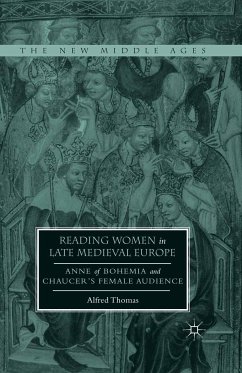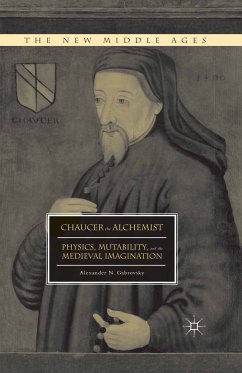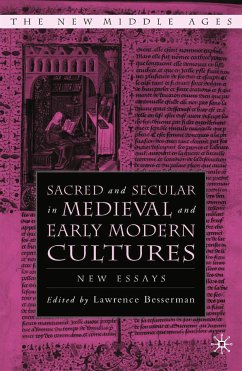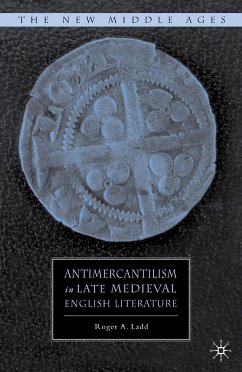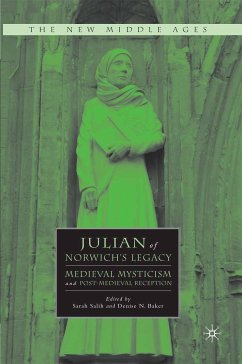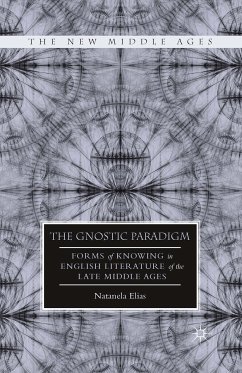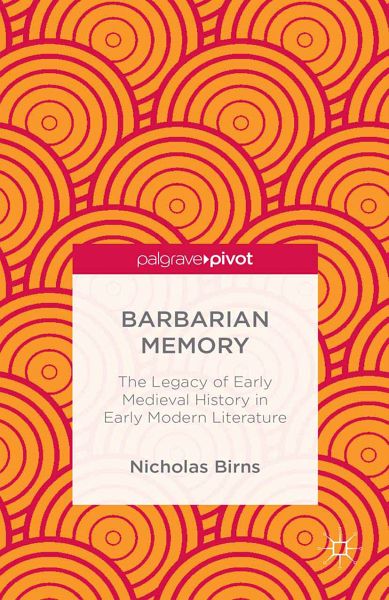
N. Birns
eBook, PDF
Barbarian Memory: The Legacy of Early Medieval History in Early Modern Literature (eBook, PDF)

PAYBACK Punkte
20 °P sammeln!






An investigation of the use of Late Antique European history by late medieval and Renaissance writers such as Chaucer, Shakespeare, Davenant, Trissino, and Corneille. The liminality of the late antique period and the issues of ethnicity and religion it raises makes it very different from that of the classical world in analogous writers.
Dieser Download kann aus rechtlichen Gründen nur mit Rechnungsadresse in A, B, BG, CY, CZ, D, DK, EW, E, FIN, F, GR, HR, H, IRL, I, LT, L, LR, M, NL, PL, P, R, S, SLO, SK ausgeliefert werden.
Nicholas Birns is Associate Teaching Professor at the New School, USA. He is the author of Understanding Anthony Powell and Theory After Theory: An Intellectual History of Literary Theory From 1950 to the Early 21st Century, as well as the co-editor of A Companion to Australian Literature Since 1900, which was named a CHOICE Outstanding Academic Book in 2008.
Produktdetails
- Verlag: Palgrave Macmillan US
- Seitenzahl: 131
- Erscheinungstermin: 23. Oktober 2013
- Englisch
- ISBN-13: 9781137364562
- Artikelnr.: 46754002
'Barbarian Memory will be of interest to a variety of early-period scholars. It urges us to recognize the paradoxical and conflicted narrative of history and religion that emerges when we cast into relief the matter of the barbarian as part of a cultural tapestry extending from the late antique to the early modern period. Birns uncovers a barbarian uncanny that re-shapes literary readings at the levels of both character and form. - Seeta Chaganti, Associate Professor of English, University of California, Davis, USA JV
FF8807E4-9A84-42BD-9BE8-5771870C598F 693782 Electronic Book Text 595577 9781137348753 1137348755 Building Cosmopolitan Communities A Critical and Multidimensional Approach E.Book Building Cosmopolitanism 14/08/2013
FF8807E4-9A84-42BD-9BE8-5771870C598F 693782 Electronic Book Text 595577 9781137348753 1137348755 Building Cosmopolitan Communities A Critical and Multidimensional Approach E.Book Building Cosmopolitanism 14/08/2013
Mehr anzeigen
08/14/2013 56A Politics - USA Academic A. Nascimento 41908 By (Author) Author Record 1 Associate Professor of Philosophy University of Washington anascim@u.washington.edu 56A Politics - USA Academic US Domestic Pal Scholarly E7 - Distributed to Vendors E3 - Basic Record Set Up JPA - Political science & theory; HP - Philosophy; HPS - Social & political philosophy; JFFS - Globalization POL010000; PHI019000; POL011000; POL033000 Politics - Political Philosophy, Theory and Thought Professional and Scholarly 48.33 90.00 Green EPUB EBook 256 0 sa 2015-06-08 17:31:06.873 Words All Formats Introduction 1. Plural Discourse Communities as Point of Departure PART I: A CRITICAL AND MULTIDIMENSIONAL APPROACH 2. The Transformations of the Critical Tradition 3. Discourse Philosophy as a Critical Framework PART II: COMMUNITIES, HUMAN RIGHTS, AND COSMOPOLITAN IDEALS 4. Individuality and Collectivity in Changing Concepts of Community 5. From Plurality to Global Human Rights Discourses 6. Cosmopolitan Ideals and the Norms of Universality 7. Cosmopolitan Communities under Construction Conclusion Building Cosmopolitan Communities contributes to current debates on cosmopolitanism by discussing the justification and application of norms and human rights in different communitarian settings. Reviewer: Eduardo Mendieta Based on what I received (a proposal, an introduction, and two chapters), I like to immediately recommend that this book be contracted and eventually published. There are many virtues to the project. First of all, the author is right that by now it is time to attempt to survey the variety of theories and discourses on human rights and cosmopolitanism. Evidently, there are some general overviews of 'cosmopolitanism' but some are already dated (Archibungi, Held, and the wonderful anthology Debating Cosmopolitics), or they are skewed towards one or another theoretical perspective. I was fortunate to hear the author at a professional meeting in which he offered a typology of discourse on cosmopolitanism that gave me the impression that the author is vastly and prodigiously informed and thus in a propitious place to offer this kind of survey and typology. Second, the author not only aims to offer this kind of survey and typology, but wants to demonstrate the distinct virtues of what he calls discourse theory (Apel and Habermas, and younger followers) in developing a normative theory of cosmopolitanism that takes the form of human rights. Third, and consequently, when the volume appears it will be a welcome contribution to that very distinct and comprehensive tradition that counts already three or four generations (depending if we add a younger cohort Amy Allen, Ingram, Forst, Mendieta, Pensky, et. al. ) that takes up where Benhabib, so to say, left off. Fourth, this is one of the very few books that offers a very thorough analysis and genealogy of the development of the 'discourse theory' paradigm by both Apel and Habermas. Generally, even Frankfurt School Critical Theorists, give the credit for discourse ethics and a discourse theory of democracy only to Habermas. Nascimento, in chapter 1 and 2, offers one of the best
Schließen
Für dieses Produkt wurde noch keine Bewertung abgegeben. Wir würden uns sehr freuen, wenn du die erste Bewertung schreibst!
Eine Bewertung schreiben
Eine Bewertung schreiben
Andere Kunden interessierten sich für





